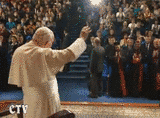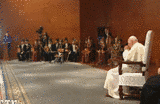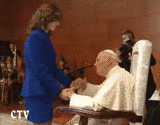John Paul II's Pastoral Visit to Kazakhstan
22nd - 25th September 2001
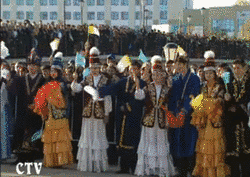
Saturday, 22nd September
"Beloved peoples of Kazakhstan! Having learned from the experiences of your ancient and recent past, and especially from the sad events of the 20th century, you must see to it that your commitment to your country is always based on the safeguarding of freedom, the inalienable right and profound aspiration of every person. In particular, recognize the right to religious freedom, which enables people to express their most deeply held beliefs. When in a society citizens accept one another in their respective religious beliefs, it is easier to foster among them the effective recognition of other human rights and an understanding of the values on which a peaceful and productive coexistence is based. In fact, they feel a common bond in the awareness that they are brothers and sisters, because they are children of the one God, who created the universe.
I pray that God Almighty will bless and strengthen your steps along this path. May he help you to grow in freedom, unity and peace. These are the conditions necessary for establishing a climate conducive to an integral human development that is attentive to the needs of everyone, especially of the poor and suffering."
- JPII - Arrival Speech (in English, French, German, Italian, Portuguese & Spanish) - Astana International Airport
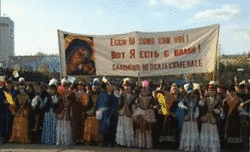
Sunday, 23rd September
"There is one God". The Apostle proclaims before all else the absolute oneness of God. This is a truth which Christians inherited from the children of Israel and which they share with Muslims: it is faith in the one God, "Lord of heaven and earth", almighty and merciful.
In the name of this one God, I turn to the people of deep and ancient religious traditions, the people of Kazakhstan. I turn as well to those who belong to no religion and to those who are searching for truth. To them let me repeat the well-known words of Saint Paul, which it was my joy to hear repeated last May at the Areopagus in Athens: "[God] is not far from each one of us, for in him we live and move and have our being" (Acts 17:27-28). And I recall what was written by your great poet Abai Kunanbai: "Can his existence really be doubted / if every thing on the earth bears witness to him?" (Poetry, 14).
"There is one mediator between God and men, the man Christ Jesus". After proclaiming the mystery of God, the Apostle contemplates Christ, the one mediator of salvation. His is a mediation, Saint Paul notes in another of his Letters, which works through poverty: "Though he was rich, he became poor for your sake, so that by his poverty you might become rich" (2 Cor 8:9).
Jesus "did not count equality with God a thing to be grasped" (Phil 2:6); he did not want to appear before our humanity, which is poor and fragile, in his overwhelming superiority. Had he done so, he would have obeyed the logic not of God but of the potentates of this world, denounced unequivocally by the prophets of Israel, like Amos, from whom today’s First Reading is taken.
The life of Jesus was in full harmony with the saving plan of the Father, "who desires all people to be saved and to come to the knowledge of the truth". He bore faithful witness to the divine will, giving "himself as a ransom for all". Giving himself completely in love, Jesus won for us friendship with God, which had been lost because of sin. This "logic of love" is what he holds out to us, asking us to live it above all through generosity to those in need. It is a logic which can bring together Christians and Muslims, and commit them to work together for the "civilization of love". It is a logic which overcomes all the cunning of this world and allows us to make true friends who will welcome us "into the eternal dwelling-places" , into the "homeland" of heaven."
- JPII - Homily (in English, French, German, Italian, Portuguese & Spanish) - Square of the Motherland, Astana
"To Mary I entrust all of you: Christians and non-Christians, believers and non-believers. She is the Mother of all, because Christ her Son is the Saviour of all. May Mary help all of you, dear Brothers and Sisters, to accomplish in your daily lives Christ’s command: "Love one another", which is the guiding theme of this pastoral visit of mine."
- JPII - Angelus Domini (in English, French, German, Italian, Portuguese & Spanish) - Square of the Motherland, Astana
"Dear Brothers, I wish to end by encouraging you to promote ecumenical dialogue. Your pastoral activity is carried out in close contact with the members of the Orthodox Church, who share the same faith in Christ and the richness of a large part of the same ecclesial tradition. May your mutual relations be characterized by warmth and respect, in fidelity to the Lord’s words: "Love one another". At the dawn of the new millennium, let us harbour the hope that Christ’s disciples, even if not fully united, will be at least closer to one another, also as a result of the experience of the Great Jubilee of the Year 2000.
Respect and dialogue should also be fostered in relation to the Muslim community, with those who belong to other religions and with those who profess themselves to be non-believers. May everyone be able to appreciate the gift of your faith lived in charity and may they open their hearts to the most profound dimensions of life.
I entrust your pastoral mission to Mary, Star of Evangelization and Queen of Peace. In the Cathedral of Astana you venerate her as the Mother of Perpetual Help. Into her maternal hands I place your endless work, your expectations and your plans; may she guide and sustain you every step of the way."
- JPII - Address (in English, French, German, Italian, Portuguese & Spanish) to the Ordinaries of Central Asia) - Apostolic Nunciature, Astana
"It is the first time I visit this part of the globe, Central Asia. The first source of information on Kazakhstan was for me Fr Bukowinski, who is well known here. During the Second World War he was deported as a priest from Poland to the Soviet Union and here he passed his entire life. Here he died and was buried, at Karaganda."
- JPII - Address (in English, French, German, Italian, Portuguese & Spanish) to the President of the Republic - Presidential Palace, Astana
"Recognizing this, dear young people, I greet each one of you. To all of you I say as a friend: peace be with you, may peace fill your hearts! Know that you are called to be the builders of a better world. Be peace-makers, because a society solidly based on peace is a society with a future.
In preparing this visit, I asked myself what the young people of Kazakhstan would want to hear from the Pope of Rome and what would they like to ask him. My experience of young people tells me that they are interested in the basic questions. Probably the first question you would want to put to me is this: "Who am I, Pope John Paul II, according to the Gospel that you proclaim? What is the meaning of my life? Where am I going?" My answer, dear young people, is simple but hugely significant: You are a thought of God, you are a heart-beat of God. To say this is like saying that you have a value which in a sense is infinite, that you matter to God in your completely unique individuality.
You understand then, dear young people, why I come among you this evening with respect and trepidation, and why I look to you with great affection and confidence. I am happy to meet you, the descendants of the noble Kazakh people, proud of your indomitable yearning for freedom, which is as limitless as the steppe where you were born. You come from different backgrounds, in which suffering played a big part.
Here you sit side by side, in a spirit of friendship, not because you have forgotten the evil there has been in your history, but because you are rightly more interested in the good that you can build together. There is no true reconciliation which does not lead to generous shared commitment.
Realize that each one of you is of unique worth, and be ready to accept one another with your respective convictions as you search together for the fullness of truth. Your country has experienced the deadly violence of ideology. Do not let yourselves fall prey now to the no less destructive violence of "emptiness". What a suffocating void it is when nothing matters in life, when you believe in nothing! Emptiness is the negation of the infinite, which your steppe-land powerfully evokes: it is the opposite of that Infinity for which the human heart has an irresistible longing.
I have been told that, in your beautiful Kazakh language, "I love you" is "men senen jaskè korejmen", which can be translated as "I look upon you well, my gaze upon you is good". Human love, but more fundamentally still God’s love for humanity and creation, stems from a loving gaze, a gaze that helps us see the good and leads us to do what is good: "God saw everything he had made, and he found it very good". Such a gaze allows us to see all that is positive in things and leads us to ponder far beneath the surface the beauty and richness of every human being we meet.
Spontaneously we ask ourselves: "What is it that constitutes the beauty and greatness of the human person?" Here is the answer I give you: what makes a human being great is the stamp of God which each of us bears. According to the Bible, a human being is created "in the image and likeness of God". This is why the human heart is never satisfied: it wants more and better, it wants everything. No finite reality satisfies or placates its longing. Saint Augustine, one of the early Church Fathers, wrote: "You have made us for yourself, O Lord, and our hearts are restless until they rest in you" (Confessions, 1,1). Is it not perhaps the same intuition that prompts the question which your great thinker and poet Ahmed Jassavi repeats several times in his poems: "What is life’s point if not to be given, and given to the Most High God?"
- JPII - Address (in English, French, German, Italian, Portuguese & Spanish) to young people - Aura Magna of the Eurasia University, Astana
John Paul II speaks in Russian at the meeting with young people: «Вероятно, первый вопрос, который вы хотели бы задать мне, следующий: Папа Иоанн Павел II, по твоему мнению, согласно Евангелию,которое ты возвещаешь, что представляю собой я? Я! Каков смысл моей жизни? Каково мое предназначение? Мой ответ, дорогая молодежь, -- простой, но многозначительный. Так вот: ты -- помысел Бога, ты -- биение сердца Божия. Утверждать это значит как бы говорить, что ты обладаешь, в известном смысле, бесконечной ценностью, что ты имеешь значение в глазах Божиих». «Если разум управляет машинами, то сердце бьется для жизни. Дайте же вашему сердцу жиз ...
Monday, 24th September
"Rebuild the temple of the Lord: this is the mission to which you have been called and to which you have devoted yourselves. My thoughts turn at this time to your communities, once scattered and sorely tried. In heart and in spirit I relive the unspeakable trials of all those who suffered not only physical exile and imprisonment, but public ridicule and violence because they chose not to renounce the faith.
Here I wish to mention, among others, Blessed Oleksa Zarytsky, priest and martyr, who died in the gulag of Dolynka; Blessed Mykyta Budka, Bishop, who died in the gulag of Karadzar; Bishop Alexander Chira, for over 20 years the beloved and generous Pastor of Karaganda, who in his last letter wrote: "I consign my body to the earth, my spirit to the Lord, but my heart I give to Rome. Yes, with my final breath I desire to profess my complete fidelity to Christ’s Vicar on earth". I also recall Father Tadeusz Federowicz, whom I know personally and who "invented" a new form of pastoral care for deportees.
In this Eucharist, I remember them all with gratitude and affection. From their sufferings in union with the Cross of Christ the new life of your Christian community has blossomed."
- JPII - Homily (in English, French, German, Italian, Portuguese & Spanish) - Cathedral of the Virgin of Perpetual Help, Astana
"One of your country’s great thinkers, the teacher Abai Kunanbai, put it this way: "A man cannot be a man unless he perceives the evident and the hidden mysteries of the universe, unless he seeks an explanation for everything. Anyone who fails to do this is no different from the animals. God distinguished man from the animals by giving him a soul... It is absolutely necessary that we constantly extend our interests, increasing the knowledge which nourishes our souls. It is important to realize that the goods of the soul are incomparably superior to the benefits of the body, and that carnal needs should be subordinated to the imperatives of the soul" (Sayings of Abai, Chapter 7).
How can we not appreciate the profound wisdom of these words, which seem like a commentary on the disturbing question asked by Jesus in the Gospel: "What does it profit a man to gain the whole world and forfeit his life?". The human heart asks questions which will not go away; when these questions are ignored, man becomes not freer but weaker, often ending up at the mercy of his own instincts, to say nothing of the aggression of others.
"If the heart no longer aspires to anything", Abai Kunanbai says, "who can unveil its thought? / ... If reason abandons itself to desire, / it loses all its depth. / ... Can a people worthy of this name do without reason?" (Poems, 12).
Questions like this are religious by their very nature, in the sense that they appeal to those supreme values which have God as their ultimate foundation. Religion, for its part, cannot fail to grapple with these existential questions; otherwise it loses contact with life.
Christians know that in Jesus of Nazareth, called the Christ, a complete answer has been given to the questions dwelling deep in the human heart. Jesus’ words, his actions and, in the end, his Paschal Mystery, have revealed him to be the Redeemer of man and the Saviour of the world. Of this "good news", which for two thousand years has been on the lips of countless men and women in every part of the earth, the Pope of Rome comes before you today as a humble and convinced witness, in full respect for the search which other people of good will are engaged in along different paths. Whoever has encountered the truth in all the splendour of its beauty must necessarily feel drawn to share it with others. Rather than an obligation based on a law, the believer feels the need to share with others the supreme Value of his own life.
Consequently – even in the context of a soundly secular State, which is obliged in any event to guarantee to each citizen, without distinction of sex, race and nationality, the fundamental right to freedom of conscience – there is a need to acknowledge and defend the right of believers to bear public witness to their faith. Authentic religious practice cannot be reduced to the private sphere or narrowly restricted to the edges of society. The beauty of the new houses of worship which are beginning to rise up almost everywhere in the new Kazakhstan is a precious sign of spiritual rebirth and a sign of promise for the future.
For their part, centres of education and culture can only gain from an openness to greater knowledge of the more vital and significant religious achievements in your nation’s history. In my Message for the World Day of Peace on 1 January 2001, I spoke of the danger of a "slavish conformity" to Western culture, observing that "Western cultural models are enticing and alluring because of their remarkable scientific and technical cast, but regrettably there is growing evidence of their deepening human, spiritual and moral impoverishment. The culture which produces such models is marked by the fatal attempt to secure the good of humanity by eliminating God, the Supreme Good" (No. 9).
Again, let us listen to the great teacher Abai Kunanbai: "All people, whatever their religion, attribute to God love and justice. Love and justice are the origin of humanity. Those in whom sentiments of love and justice prevail are the truly wise" (Sayings of Abai, Chapter 45).
In this context, and precisely here in this Land of encounter and dialogue, and before this distinguished audience, I wish to reaffirm the Catholic Church’s respect for Islam, for authentic Islam: the Islam that prays, that is concerned for those in need. Recalling the errors of the past, including the most recent past, all believers ought to unite their efforts to ensure that God is never made the hostage of human ambitions. Hatred, fanaticism and terrorism profane the name of God and disfigure the true image of man.""
- JPII - Address (in English, French, German, Italian, Portuguese & Spanish) to representatives of the world of culture, arts and science - Auditorium of the Congress Hall, Astana
Tuesday, 25th September
"These three memorable days which have enabled me to meet so many people here in Astana and to experience at first hand the vitality of the Kazakh people are coming to an end. The memory of my stay in this noble country, rich in history and cultural traditions, will be with me for a long time.
I thank you for the kind and heartfelt welcome which you have given me. I thank you, Mr President, for the exquisite hospitality which you have shown in all sorts of ways. I thank the administrative, military and religious authorities as well as those who prepared my visit and took care of its organization. To each and every one of you I express my most sincere gratitude.
The words which I have heard in the various moments we have spent together remain impressed on my mind. I have in mind the hopes and expectations of this dear people, which I have come to know and respect more deeply: a people that has suffered years of harsh persecution, but has not hesitated to commit itself with enthusiasm to the path of development. A people seeking to build a serene future for its children, marked by solidarity, because it loves and seeks peace.
Kazakhstan, a nation which has centuries of history behind it, knows how important and urgent peace is. Because of your geographical position, you are a frontier land and a land of encounter. Here, in these endless steppes, men and women of different races, cultures and religions have met and continue to meet in peace.
Kazakhstan, may you with God’s help grow in unity and solidarity! This is the heartfelt wish that I repeat as I recall the theme of this entire visit: "Love one another!". These demanding words of Jesus, uttered on the eve of his death on the Cross, have inspired and marked each stage of my pilgrimage.
"Love one another!" This country, home to men and women of different origins, needs solid agreements and stable social relations. It is not an exaggeration to say that your country has a vocation all its own: that of being, in an ever more conscious way, a bridge between Europe and Asia. May this be your civil and religious choice. Be a bridge made up of people who embrace other people: people who communicate fullness of life and hope.
In saying farewell to you, dear Kazakh people, I wish to assure you that the Church will continue to be at your side. In close cooperation with the other religious communities and with all men and women of goodwill, Catholics will not fail to do their part to ensure that all together can build a common home which is ever more open and welcoming.
The quest for dialogue and harmony has characterized relations between Christianity and Islam here ever since the time of the formation of the Turkish Khanate in the endless spaces of your steppes, and this has enabled your country to become a junction between East and West on the great Silk Road. The younger generations too should follow this path with renewed commitment.
"Love one another!" This demanding saying of the Lord tests our credibility as Christians. Jesus himself warns: "By this all men will know that you are my disciples, if you have love for one another" (Jn 13:35).
The Great Jubilee of the Year 2000 spurred Christians to an intense spiritual reawakening and called them to be witnesses to love in order to respond to the challenges of the third millennium. May you also be witnesses to love, without respite! Be ready to promote "peace, so often threatened by the spectre of catastrophic wars". Be vigilant watchmen, committed to "respect for the life of every human being".
Men and women of other religions who have the destiny of your people at heart, may you also be witnesses to love! Abai Kunanbai’s question is directed to us all: "If I have been given the name of man, can I fail to love?" (Poetry 12). I am happy to echo this question now as I leave you: can a human being fail to love?
As the Successor of the Apostle Peter, as I recall the many events which have marked the history of the past century, I repeat: Look to the future with confidence! I have come among you as ;a pilgrim of hope, and I now prepare to undertake my return journey, not without emotion and nostalgia. The memories of these days will go with me; I will carry the certainty that you, people of Kazakhstan, will not fail in your mission of solidarity and peace.
May God bless and protect you always!
- JPII - Address (in English, French, German, Italian, Portuguese & Spanish) - Farewell Ceremony, International Airport, Astana

